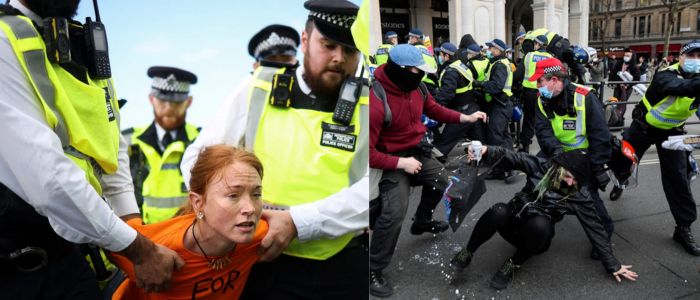A High Volume of Arrests, but Few Charges
The number of arrests for the public nuisance offence has increased almost 10 times since 2019, the year when Extinction Rebellion and the Fridays For Future protests led to huge climate change protests in the UK, a trend revealed in data gathered via freedom of information requests.
From 67 arrests over six years, 2012-2018 (with only 12% resulting in charges), the figures skyrocketed to 205 in 2019 alone. In all, 638 arrests were made between 2019 and March 2025, but only 18, or 2.8 percent, resulted in prosecutions.
The discrepancy is a clear indication to campaigners that police are using arrests to intimidate protesters and keep them in check, without proceeding to formal legal actions, they say. Areeba Hamid, co-executive director of Greenpeace UK, called it an “abuse of power and an assault on the right to protest,” and said arresting people for political inconvenience was a step down a dangerous path for any democracy.
Raj Chada, a leading protest defence lawyer at Hodge Jones & Allen, said that police had increasingly used the public nuisance charge towards the end of the XR protests. Before this adjustment, most of the protesters were being charged with lesser laws such as obstruction of the highway.
The nuisance offence gave police the powers to obtain DNA, fingerprints, and photographs and to make applications for more stringent bail conditions, Chada said, which would not be available under low-level public order offences.
Wider Crackdown and Legislative Changes
The crime was given legal clout under the Police, Crime, Sentencing and Courts Act 2022, which brought in a higher degree charge that could land a convict in jail for up to 10 years. It became one of the harshest charges invoked against nonviolent protesters.
Four Just Stop Oil activists were convicted under this law in 2023, receiving prison sentences of up to five years — the longest time ever given to peaceful protesters in the U.K.
Despite the harsh law, criminal charges have remained low. In 2021 272 people were arrested in the campaign by Insulate Britain – but not a single person faced charges. (12 charges were filed in 2022, including against Roger Hallam and other Just Stop Oil participants. There have been no subsequent charges made under the law since then, although detentions have persisted.
“There is, in the end, no real surprise in an uptick in arrests which are often used as a pretext for search and seizure actions on phones and laptops, and for raids on protesters,” said Tim Crosland, director of the environmental litigation group Plan B. He framed it as part of a wider effort to clamp down on civil society.
Police Defend Their Actions
The Metropolitan Police defended its strategy, saying that arrests are made on the “well-established legal threshold of reasonable suspicion” while prosecutions require a higher threshold. A public nuisance conspiracy needs to be proven in court, a spokesperson said, and it is especially difficult to do so which adds to why charges are so rare.
Despite these rationalizations, campaigners are concerned that lawfare is being used not to serve justice, but to dissuade and disrupt public dissent.
World

Met Police Under Fire Over Protest Arrest Tactics

The Metropolitan Police has been accused of abusing its power to shut down peaceful protests in London, after figures revealed a huge spike in the number of people arrested for conspiracy to cause a public nuisance – a crime being brought to court in just a small minority of cases.















